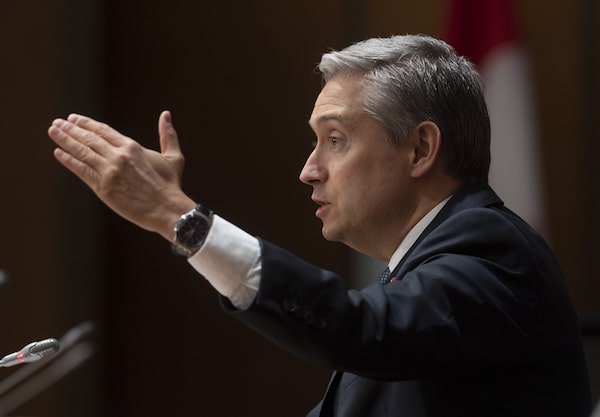Canada says it will no longer allow people to be extradited to Hong Kong and will block the export of sensitive military goods to the former British colony, citing the harsh new national-security legislation China has imposed on the Asian city.
And Prime Minister Justin Trudeau says Canada is looking at additional measures, including on immigration, “in the days and weeks” ahead that could help Hong Kongers who want to flee.
Foreign Affairs Minister François-Philippe Champagne said Canada is taking these actions because of the security law China enacted this week that critics say eliminates the autonomy Beijing promised the territory when it took control in 1997.
“Canada joins the international community in reiterating its serious concern at the passage of national-security legislation for Hong Kong by the Standing Committee of the National People’s Congress of China,” Mr. Champagne said in a statement.

Foreign Affairs Minister Francois-Philippe Champagnen seen here at a news conference in Ottawa on April 2, 2020, has criticized Beijing's passage of a Hong Kong national security law.Adrian Wyld/The Canadian Press
“This legislation was enacted in a secretive process, without the participation of Hong Kong’s legislature, judiciary or people, and in violation of international obligations,” Mr. Champagne said.
A Canadian government official familiar with Friday’s announcement said Ottawa wants to prevent equipment being shipped to Hong Kong that could be used by the local police to suppress protests. The Globe and Mail is not identifying the official because they were not authorized to speak publicly on the matter.
Mr. Champagne said the new security law ignores the “one country, two systems” pledge that China promised would govern Hong Kong when it was handed over by Britain more than two decades ago: that for 50 years, the former colony would retain Western-style freedoms and an independent rule of law.
New security law could splinter Hong Kong’s justice system, erode rights to fair trial
Hong Kongers scramble for safe havens as Beijing tightens its grip
Canada, and the world, must respond to China’s ominous actions in Hong Kong
Canada’s announcement follows actions by allies including the United States, Britain and Australia.
The U.S. has begun scaling back the special status that Hong Kong had enjoyed when it was considered a semi-autonomous region, ending military exports and limiting the shipment of high-tech products to the city. In response to the legislation, Britain has announced that it will create five-year work and study visas for the city’s 2.9 million holders of British national (overseas) passports, giving nearly half of Hong Kong’s population a path to British citizenship.
Australian Prime Minister Scott Morrison signalled Thursday that his government may follow Britain in offering visas to Hong Kong citizens. Mr. Morrison said Thursday that events in Hong Kong were concerning and that the Australian government was “prepared to step up and provide support.”
Mr. Trudeau offered no details on the immigration measures Canada is considering.
Close to 50 Hong Kongers – many of whom took part in the massive demonstrations that began last year – are already seeking asylum in Canada, citing harassment and brutality at the hands of police in Hong Kong and fear of unjust prosecution.
Amnesty International and other human-rights groups have documented arbitrary arrests, brutal beatings and torture committed by Hong Kong police since mass protests began in mid-2019 over proposed legislative changes that would have allowed extraditions to mainland China.
Canada’s military exports to Hong Kong over the past five years on record – 2014 to 2019 – exceed $48.7-million, according to reports published by Canada’s department of Global Affairs. They consist of goods for the Hong Kong police, as well as the territory’s marine and flying services, and include items such as firearms and aircraft.

Protesters chant slogans and hold a placard during a July 1, 2020 rally against a new national security law in Hong Kong, on the 23rd anniversary of the city's handover from Britain to China. Slogans and signs advocating for Hong Kong independence have been outlawed under the new law.ANTHONY WALLACE/AFP/Getty Images
In the past, Canada may have also exported tear gas or riot-control equipment, as well as electronic jamming equipment. The Canadian government obscures the exact details of exports in some cases by only reporting the category to which they belong.
In 2014, when Hong Kong was trying to quell protests during what was called the “Umbrella Revolution,” Canadian companies were granted export permits for more than $600,000 of what are called Category 2.7 military goods, according to a Global Affairs report for that year. This category includes chemical agents such as sarin – which Canada is very unlikely to have permitted for export – but also tear gas and other riot-control agents, as well as gas masks and protective gear.
In 2017, Canada exported more than $64,000 of gear under a category that includes electronic imaging and countermeasure gear. In 2019, nearly $11,000 of equipment was exported under a category that includes electronic jamming equipment.
Canadian companies exported $48-million of worth of aircraft to Hong Kong in 2015. Reports have indicated that these were Bombardier Challenger 605 aircraft delivered to the Hong Kong Flying Service, the successor to the Royal Hong Kong Auxiliary Air Force, which supports law enforcement as well as search and rescue. This department reports to Hong Kong’s Security Bureau.
Our Morning Update and Evening Update newsletters are written by Globe editors, giving you a concise summary of the day’s most important headlines. Sign up today.
 Steven Chase
Steven Chase